
Access to Data
Funding and financing
Old and New “Nature”
Adaptation over mitigation
Social AND technology innovation
Regulation to level the playing field
Private and public sector collaboration
Engaging all stakeholders and actors in policy making
Acceleration of climate urgency from both the Pandemic and Ukraine crisis
…. these were some of the themes that emerged at the inaugural European Tech for Climate Action (TFCA) conference in Brussels on October 27th that featured close to 200 delegates and a notably diverse forum of speakers. Between the conference and the publication of this report, COP 27 transpired in Egypt – leaving an imprint of mixed reviews, and a general sense that much more meaningful action is urgently needed from ALL nation states globally. On par with the theme of TFCA, the Framework Convention on Climate Change (UNFCCC) did launch a new five year work program at COP 27 to promote climate technology solutions in developing countries. The concepts, ideas, challenges and opportunities presented in Brussels provided some bright points of light for how any region could advance what must be an ambitious program and steadfast vision by multiple stakeholders across government, city, venture capital, industry and technology. Let’s dive in.


WELCOME FROM THE HOST CITY
The proverbial ‘ribbon’ to the conference was cut by the eloquent Ans Persoons, Deputy Mayor, Alderwoman of Town Planning and Public Spaces for the City of Brussels… more With a warm welcome to the delegates, Deputy Mayor Persoons reinforced that optimal solutioning for Climate Action happens with coordination of local to international level efforts, and with choreography of multiple stakeholders – from innovators to policy decision makers. Ultimately innovation will unlock the path forward on scaling up renewable energy and green mobility solutions for cities like Brussels. On this path forward, Ms. Persoons highlighted a particular challenge for her city, that is shared by many cities in Europe – preserving historic culture in the face of modern transformation for climate action. How can innovation drive opportunities to retrofit old roof tiles with today’s photovoltaic panels? Can we create insulating paint that will still also maintain the beautiful facades of historic buildings? Can we find the right balance in enabling the change while maintaining the “beauty of heritage”? Even with these questions, the Deputy Mayor acknowledged the power of technological innovation to empower cities to not just drive greener communities, but also to enable cities to share knowledge, facilitate group purchases, and generally advance collaboration towards better outcomes. And we are still early on this journey with much to do. As she concludes, she hopes that the conference will inspire us to “get straight down to working out on how we can do more, better and sooner, together.”
A VIEW FROM THE EU
A broader EU view and perspective was delivered by Virginijus Sinkevičius, EU Commissioner for The Environment, Oceans and Fisheries…more Citing initiatives from the EU like The Green Deal, Digital Product Passport and NextGenerationEU, and declaring that policy makers must look to the future, the Commissioner underscored the changing nature of value chains and business models, and that the Pandemic certainly sped up digitalization and the relevance of technologies in this transformation by several years. The Digital Product Passport is set to “really unlock circular value” by making transparent not just the traceability of products, but also of the component parts as it would disclose the precise information about what’s inside, about performance and transactions that would yield better predictive maintenance, optimal use, and secondary market opportunities. Given many raw materials do not originate from Europe, the Passport would arm the EU with information and enable the union with greater strategic autonomy. One of the major platforms for initiatives to manifest is the city. The Commissioner acknowledged that cities are 4% of land area but house 75% of EU citizens. They consume 65% of the world’s energy and are accountable for 70% of Co2 emissions. This footprint means that regardless of initiatives driven by the EU, challenges will not be solved without cities being on board. The good news is of course that cities are getting on board. The Green City Accord is a movement by European city mayors to make cities cleaner and healthier. And funding is powered by programs like the €95.5B research and innovation fund called Horizon Europe that focuses on climate action activities. Horizon Europe is driving a specific initiative called EU Mission led by businesses, investors, local authorities and citizens with the goal to deliver 100 climate neutral smart cities by 2030. Commissioner Sinkevičius encouraged a focus on “nature-based solutions” – using nature to help urban dwellers mitigate the effects of climate change. Be they “Green, Blue or Hybrid”, natural entities such as forests, wetlands, green roofs, parks, etc. should be integrated into the infrastructure planning process. And cities can learn from each other. Florence and Helsinki might have very different approaches due to their different environments, but they can most certainly learn from each other. And lastly, but notably, the Commissioner sent a technology-positive message, advising that success requires an integrated approach – an approach that harnesses the power of nature together with smart technologies to rethink cities of the future. “We were lucky with Covid”, he said, in that the world was able to manufacture a vaccine. Unfortunately, there is no vaccine, no silver bullet, for addressing climate challenges, but we must focus and leverage the power of cities on the journey.
A VIEW FROM MEMBER STATE
The State Secretary for the Environment and Climate Change for Finland, Terhi Lehtonen, brought a sobering tone at the start of her talk – citing that we are not on track to limit global warming to 1.5 degrees per the climate agreement….more She also underscored geopolitical tensions, sharply illuminated by Russia’s war with Ukraine, makes the EU energy management more difficult to address and manage. Still Finland is focused on reducing GHG emissions 55% by 2030 and achieving climate neutrality by 2035. And the way forward towards these goals is with more innovations, more technologies that enable solar, wind energy and flexible storage, and more scalable deployments. Finland has been leveraging the RRF (Recovery and Resilience Funds) from the EU, with about half of their allocated funds going to climate action and digitalization, which is starting to bear fruit. Buildings and households are moving to energy renovations, and with green transition loans accessible to homes and small business. Some innovative initiatives are emerging in Finland, where a local heating company has installed an electric boiler to supply heat when the electricity spot price drops sufficiently. Or the pioneering actions taken by a large EV charging network provider that will turn off when utility drops below a certain threshold to help stabilize grid operations – all without any disruptions to the resident. The State Secretary emphasized that more needs to be done and with better technology, and begged the questions: Do we have the production lines to scale? Do we have the skills of talent who can come in and refurbish homes? Have we deployed all the right Smart solutions? What are the bottlenecks that we need to focus on? Ms. Lehtonen firmly believes that many of these questions can and should be addressed by technologies that pave the way for adaptation and resilience. And financing is central to unlocking the solutions that will accelerate the movement towards meeting the Paris Agreement Objectives and COP commitments. Indeed, financing and funding was a rich topic of focus in one of the afternoon panel sessions.
A VIEW FROM TECH
The morning keynotes were rounded out by a thoughtful and practical overview on the role of technology for impact from Karen Massin, Head of Government Affairs and Public Policy Europe for Google who took to the podium to share broad-reaching initiatives and programs undertaken by Google……more While all of us know Google, not as many are as aware on Google’s commitment and efforts in Sustainability, which has been core to the enterprise since its inception three decades ago. This core has been supported by a three-pronged strategy focused on: · Google’s own operations and supply chain · Engagement with their partner ecosystem · Consumers through Google products Google in Europe has been actively engaged in key initiatives such as the EU Climate Pact, Green Digital Coalition, and the Climate Neutral Data Centre Pact, the last of which Google helped fund. While it is a fantastic and popular pursuit to be carbon free, Google has also been focused on reducing consumption of energy altogether – particularly in their Data Centers, where they lead in energy efficiency. Compared with even just five years ago, Google’s Data Centers today are twice as efficient and generate 5X more computing power with the same amount of electric power utilized. And Google’s sustainability agenda is bigger than Carbon – with other key efforts focused on water utilization and waste. Google aims to replenish 120% of water used in their offices and Data Centers while also improving the water quality in communities in which they operate where it is a scarcer resource. With a circular economy goal as a NorthStar for Google, they strive towards zero waste to landfill in their Data Centers, reducing the food waste among “Googlers” and zero waste to landfill overall by 2025. Significant investments are also going into the products and tools that Google is availing to communities, cities and states in their pursuit of a Sustainability agenda for all stakeholders. The Google Earth Engine is free to use by researchers, developers, etc. for satellite imaging and data. Google’s Forest Watch helps key stakeholders to detect illegal logging. Similarly Google’s Fishing Watch supports the tracking of commercial fishing fleets for detection of illegal fishing. Google’s Surface Water Explorer is being used by the UN to advance their efforts towards the UN SDG’s. With Climate Change and commensurate rising sea levels, Google is deploying their data capture and modeling innovation to collaborate with India, Bangladesh, Sri Lanka and Brazil on capturing the number and severity of floods – which impacts the lives of more than half a billion people who live in high hazard flood zones. The same frameworks and models power Google’s work in identifying wildfire and urban heat island hazards. With Search and Google Maps, Google enables users to be more intelligent around more sustainable options for travel, for routing, and recycling options. And Google’s intelligent thermostat business supports smarter buildings – which, after the transportation sector, is one of the highest GHG emitters in cities around the world. Meanwhile, Google is fostering the innovative ventures with their foundation Google.org which powered $10M in grants in its inaugural program in 2020. An outcome from the first program is normative.io, who provide a carbon calculator for Small, Medium sized enterprises. With the platform that already has 3000 entities, these smaller, less resourced businesses can provide them a view with where they are on carbon footprint and track their own reduction. With this initial momentum moving forward, Google.org has launched a new impact challenge this year in 2022. Ultimately Google knows that partnerships are essential in the deployment and scaling of these digital tools for optimal impact. The collaboration between the tech industry and other stakeholders will be instrumental in moving “from pledges to progress”.

WHERE NATURE AND HUMAN DESIGN REDEFINES ‘URBAN ECOLOGY’
The “Thinking Point” mid-day reflection at the conference was curated by Bas Smets, Landscape Architect and winner of the project to redesign the surroundings of Notre-Dame de Paris…more With a background in civil engineering and architecture, Bas is a tremendously accomplished pioneer and entrepreneur and has completed more than 50 projects with a team of 20 architects and landscape architects since 2007. The aim of his projects is to create “augmented landscapes” using the “logic of nature” to create a new microclimate in the environs of the landscape. In his opening, Mr. Smets underscored the importance of focusing on the transformation of cities. In summoning Alexander van Humboldt into the narrative, Mr. Smets shared his appreciation for how the “father of the invention of the biosphere” progressively used design and technology as it was in the 18th century to understand how things work. These principles have become part of the foundation by how his team works with the manmade environment of cities, and “bring nature back in”, with the appreciation that the human-made environment as a “new kind of nature”. Mr. Smets has been focused on cities as he believes that the transformation of cities will have the greatest planetary impact and shared three vastly varied scales of his team’s work within cities – one at 40 sq meters, one at 4,000 sq meters, and one at 40,000 sq meters. Through his work, he demonstrates the possibilities from rethinking “cities as urban ecology”. The 40 sq meter project was in London’s “Sunken Garden”, with a plot of land that was 4mx 8m. With what started as a damp stone courtyard, Mr. Smets’ and team leveraged the unique microclimate created by the constitution of the ground (that was almost subtropical) and walls which protected it from the sun and wind – creating a 4-degree differential between the inside and outside of the plot – into a green sanctuary that remarkably fostered some of the tallest fern trees witnessed in the UK. The 4,000 sq meter project was based in Paris, on an urban boulevard. Here the team took the structure of the esplanade and flow of the boulevard and created a landscape that incorporated new trees, an “avalanche” of stairs, glass facades “like glaciers” into what was an entirely manmade but organically integrated environment. And technology in the form of computer programming was key in orchestrating the dynamics of this infrastructure, along with “training the trees” to adapt to a new kind of environment for their growth – all with an ecological soundness and aesthetically natural flourish. And the third project, at 40,000 sq meters, was in the south of France – with greater complexity and difficulty than the first two. The site was where a former railyard with locomotives had once adorned the landscape – so no earth, no soil was left behind, with only bedrock remaining after the site was abandoned in the 1980s. Despite the industrial wasteland as the physical reality, the city’s goal was to make a park for the city on this desert. So, Mr. Smets knew that before a park could be designed, they needed to change and design the climate. The good news was that around the location was a rich ‘bio-region’ from which the team could pull the “logic of plants” to transform the ecosystem into one that would be almost Mediterranean. The goal was to “do what nature would have” – but in an accelerated fashion. Upon completion of the project, nature came roaring back to the site – with verdant vegetation and over thirty-six animal species spotted on site, including an abundance of birds and fish. Through his presentation and examples, Bas demonstrated how to use nature’s ‘technology’ and human technology to transform urban landscapes into “climate-smart” landscapes – even in situations where the possibility of regenerative growth seemed dim.
EU LEADERSHIP IN THE GREEN AGE OF INNOVATION
The urgent need for Climate Action requires strong and collaborative leadership across stakeholders in industry, government and tech…more Moderated by Katarina Wallin Bureau, Founder and Managing Partner, RISE, this session brought to life some of the ways that these players can work together more effectively to drive change and best practices. On the panel: Andriy Moskalenko, Deputy Mayor, City of Lviv in the Ukraine Christel Vandenhouten, Head of Sustainable Development for Brussels Airport Jacques Beltran, VP Cities and Public Services for Dassault Systèmes Anna Williams, EMEA Solutions Lead, Geo for Environment at Google Lucas Demuelenaere, Mobility, Clean Air and Climate Advisor, Government of Brussels-Capital Region Philippe Tulkens, Head of Unit Climate and Planetary Boundaries, DG RTD and Deputy Mission Manager, EU Mission on Adaptation to Climate Change, European Commission Whether you are in the state government, city representative, industry, financier, or tech – the climate goals are ambitious, and they need to be given the near horizons of 2030, 2040, and even 2050 with some extrapolation from today’s climate causal links. It is incumbent on all stakeholder leaders to keep fast to the goals and constantly forge a path of collaboration. Ms. Bureau references John Elkington’s book, “The Zeronauts: Breaking the Sustainability Barrier”, and welcomed representative “Zeronaut” leaders to the stage. With the Russia war on Ukraine top of mind across sectors and government across Europe, Mr. Moskalenko’s presence on the panel was both welcome and of poignant interest. Notably, even while his city, Lviv, fights a war of national sovereignty and liberty, the city is still also focused on the longer-term goals of sustainability alongside his EU peers. Meanwhile Ukraine’s fight for survival against Russia shares some key lessons that might be extrapolated to our collective fight for our survival against climate change – people will have to make sacrifices and build a consciousness of changed behavior. It all starts with awareness, especially around limited resources. Very soon, as is already happening with the war in Europe, we will all need to balance “immediate urgencies” against longer term survivability and ‘thrive-ability’. Philippe Tulkens acknowledged and commended Ukraine’s especially heavy burden on forging a viable future and underscored continued support from the European Commission. Concurrently, he shared the commitments of other cities in Europe through the EU Mission, and how 100 cities have made the commitment to be climate neutral (with over three hunderd cities applying) by 2030. The journey forward will be powered by innovation and technologies, with the first ‘technology’ being nature itself, and encouraging engineers to leverage the organic engineering that happens in nature to not just mitigate climate impact but adapt – as that has after all been the historical nature of nature. In this way Mr. Tulkens echoed some of the sentiments of Commissioner Sinkevičius from the morning keynote. As expressed by his EU colleagues throughout the day, Mr. Tulkens calls out the critical role of data – but also seeks to focus on social data, not just environmental data, as evidence towards impact and outcomes for transformation of cities and communities. Also like his EU colleagues throughout the conference, he also underscores the importance of private and public sector partnerships, in particular to address the challenge of making Data accessible and understandable to the general public. At the city level, Lucas Demuelenaere agreed with Mr. Tulkens on the need to mobilize the private sector to help change people’s behavior and overcome resistance to change and what might be perceived as undesirable ‘sacrifices’. Part of the role that cities can play in influencing this social change is through bringing together the various ‘actors’ or stakeholders across the city ecosystem, in particular the residents. And while on the one hand Cities are particularly vulnerable to the impact of climate change, they can also conversely be a great source of innovation. Mr. Demuelenaere offers three ideas for what various actors in the narrative can do: 1. Clear frameworks that can shine the path to emission reduction 2. Social innovation in addition to technological innovation – households and residents need to re-engineer behaviors and habits 3. Have the willingness and ambition to make change The speed to change and scale will also be critical. Cities need to be able to access technology tools and innovations more quickly and learn about best practices in terms of what has worked in other scenarios. The voice of industry came from the world of Aviation, via Christel Vandenhouten from Brussels Airport. Given the higher levels of scrutiny that the transportation sector tends to experience in the sustainability narrative, it was not surprising to hear about Brussels Airport’s urgent actions to decarbonize, with Sustainability being one of three strategic pillars for their Shift 2027 endeavors. As other industry sectors, Brussels Airport is diligently exploring new innovations to drive their ambitions, especially given the changing nature of the aerospace ecosystem. Knowing that flights will soon (next 10-15 years perhaps) run off electricity and hydrogen, they need to rethink their infrastructure for supply the next kind of ‘fuel’. The airport is advancing use of regenerative energy with wind and solar and advancing the deploying of geothermal energy for heating plants and electrifying their fleets of company and service vehicles. The airport is using Digital Twin technologies to be able to measure and visualize their ‘innovative trajectory’ in addressing air quality, noise and other environment-related changes. All of this supports how Brussels Airport is demonstrating their leadership in industry and their commitment to the Green Deal and a related green aviation initiative called ‘Stargate’ that will further power their commitment. The two tech industry insights from the panel were from Google and Dassault – with both companies bringing their expertise and capability around data to the forefront in the fight for climate action. Anna Williams from Google discussed the role of their Environmental Insights Explorer that supplies a plethora of data that can be used by City planners and City residents – from building emissions to solar panel potential, to air quality data, and even tree canopy data. With about 40,000 cities around the world leveraging the platform, Google aims to reduce the time and cost of resources to extract similar data, as well as to democratize access and contribution to the data. The more data that can be accessed and shared, the better the quality of the analytics and the better the prescriptive nature by which stakeholders can apply the data towards climate outcomes. Dassault’s forty-year history has been focused on leveraging data for insights through their ‘virtual platform’ and 3D modeling capabilities. With a start in manufacturing design, Dassault innovation has quickly found relevance in other sectors, and now increasingly with City planning as the virtual or digital twinning technologies can simulate real world design and environments to prepare for and address climate issues. And the ability to cross-pollinate technologies has been instrumental in the relevance of the platform. For example, the Philharmonic in Paris asked Dassault to help them re-open from Covid in a way that would minimize risk of infection with the audience. For this Dassault took their virtual tools developed for hospitals in tracking particles and their air flow simulation technology for aviation and combined them to successfully devise a solution for the Philharmonic. In another part of the world Dassault is partnering with NTT for the city of Kyoto, to simulate flooding scenarios that would then alert the residents of the city of any incidents and help them prepare and manage through a flooding emergency. Leadership, in any situation, requires grit, confidence, thoughtfulness and grace. In the face of a possible climate disaster in the horizon, Europe needs leaders from industry, government, tech and finance to step up, step in, hold hands and lead the way. This panel demonstrated the right mindset and appetite for this kind of leadership to thrive.
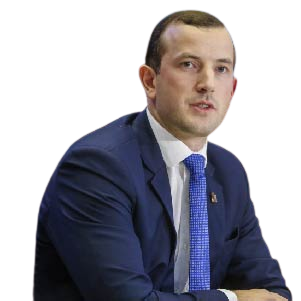

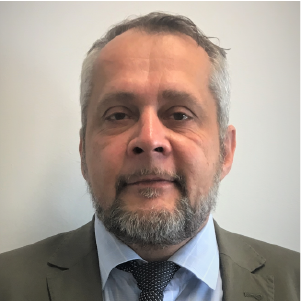

FROM NET ZERO TO PLANET POSITIVE
The afternoon conference tone was set by Anne-Catherine Lorrain, Political Advisor in the Committee for Legal Affairs for the European Parliament and member of Planet Positive 2030. …more Planet Positive is an open global initiative that brings together a community of researchers, technologies, policy makers and is supported by IEEE Standards Association, which itself is the world’s largest technological association with over 400,000 members, focusing on advancing technology for the benefit of humanity. The goal of Planet Positive is to develop practical paths to achieve a sustainable planet by 2030 and beyond by changing how technology standards are designed to prioritize people and planet. And to a finer point around the pragmatic ethos of the organization, in Ms. Lorrain’s words, the work is “science-based…NOT science fiction”. The word “Positive” from Planet Positive is to encourage giving back more than what is removed and pointing to how flourishing planet has got to be the outcome above and beyond simply Net Zero. And with the support of the IEEE, Planet Positive is on a mission to see where and how technology standards can be designed and created with the focus on responsible mitigation and concrete adaptation. And it is not just with tech, but the conjoining of tech and design – hence her repeated phrase “Sustainability by Design”. The organization is creating blueprints across a wide range of industries with working groups that publish papers on key issues that should inform policy making and help foster pragmatic and tech-driven practices. Through the organization, industry groups can show policy makers that “sustainability is the new growth” avenue.
BITS AND BYTES TOWARDS CLIMATE ACTION
With the deft moderation by Marla Geibel, Project Officer, Energy, Mobility and Sustainability, CERRE, the second panel of the conference debated the initiatives and ideas around future connectivity requirements and the enabling technologies that could help EU meet climate objectives…more The Panel featured leaders from government, policy and tech: Fabian Maingain, Deputy Mayor, Alderman of Economic Affairs and Smart City, City of Brussels. Peter Stuckmann, Deputy Director, Future Networks and Head of Unit, Future Connectivity Systems, DG CONNECT, European Commission Michael Wiesmüller, Head of Department, Key Enabling Technologies for Industrial Innovation: ICT, Manufacturing and Nano, Austrian Federal Ministry for Climate Action Jean-Benoît Besset, EVP Corporate Social Responsibility at Orange Group Pastora Valero, SVP Government Affairs and Public Polity EMEA at Cisco Considering this “twin transition” in play – digital infrastructure and climate action – there were several facets to explore on how they interplay, and the role that policy and regulators play in the choreography to ensure standards and accessible frameworks. Meanwhile, Data reigned in the panel discussion as a prevailing area of need and focus to get past “Go” for Climate Action. With respect to the role of policy makers, Peter Stuckmann highlighted the Digital Decade strategy that is underpinned by four points on a ‘compass’: Skills, Infrastructure (chips, high performance computing), Government / Public Sector and Business. The Digital Decade leverages these four points to set targets to provide the political framing to then enable the member states to effectively plan and report. Also in the backdrop of the Digital Decade is the push for multi-country initiatives to pool resources and surface best practices to leverage key technologies and innovation like 5G corridors. With initiatives like Digital Decade, regulators can help connect across sectors to ensure that technologies can be fully leveraged as relevant to different industries. Fabian Maingain from the City of Brussels agreed with Mr. Stuckmann on the need for government to provide a focus on goals, rules, structures, and frameworks to create a consistency and concentration on key areas, but also acknowledged the importance of private – public sector collaboration – to deploy technologies and solutions. For example, in the city of Brussels, there will be a Smart City Strategic Plan and a Data Strategy through an open data polity with deployment of technologies in the center of the strategy. Data is critical to making any kind of progress and change with achieving climate goals, and technology is the HOW of getting access to this data. Michael Wiesmüller shared that Austria has a 2040 climate neutral goal (ten years less than average in EU), with his organization being only two years old and with a full name of: Ministry for Climate, Environment, Mobility and Technology. As the “high tech guy” from the ministry, Mr. Wiesmüller had two key messages and three principles to share for the delegates: Messages: 1. Tech community need to hear that they are part of the solution, not part of the problem 2. We need to realize that we are sitting on the shoulder of genius engineers, who are in turn sitting on shoulders of preceding engineers, who are on the shoulders of giants behind them. Principles: 1. Discussions regarding technology and urban development must be more targeted than it has in the past. Really focus on the problem. 2. We need to talk about systemic interventions if we are promoting the development of AI, sensors, etc. we need to intersect with regulation, investment and infrastructure towards outcomes. 3. We must invest in key innovative technologies that are addressing adaptation, bridging knowledge and capabilities along the way. Mr. Wiesmüller emphasized that the imperative is tech for green, more so than green tech – how AI, photonics, IoT, sensor technologies can proactively progress us forward versus simply making sure existing tech is as efficient and eco-friendly as possible. And what underpins all of this is how and when to leverage data. In his words: “Digitalization is Datafication”. And policy makers can provide a framework that is critical for how communities define use cases for sharing data and further service development. Mr. Wiesmüller went so far as to even suggest that regulation can dis-incentivize certain use cases – eg. 4K video streaming on phones. Given how much compute power, and hence energy, devices use, it might make sense for some to regulate ‘needless’ use of energy as in the case of 4K video on mobile devices for sheer entertainment purposes. Until there are innovations to manage energy consumption, thoughtfully crafted policies may be key to manage and mitigate what might be defined as ‘waste’. As the main technology player and network infrastructure provider on stage, Pastora Valero shared Cisco’s commitment to powering an inclusive future for all – partners, customers and employees. Along the way, Cisco’s commitment is to reach Net Zero by 2040 with much of the heavy lifting based on their alignment with Science Based Targets initiative (SBTi). Meanwhile, Cisco is working on this ‘tech for green’ push with innovations they are making in the hardware – exemplified by the size of a new silicon chip that used 96% less power while increasing bandwidth capacity by 35%. Additionally, the physical footprint of their equipment keeps getting smaller, making it easier to cool data centers that house Cisco equipment. Cisco has teams working on key climate solution for smart building, smart farming, energy grid digitalization – in partnerships with governments and cities. Ms. Valero underscored the importance of networks – 5G, 6G, fiber optics – to continue advancing the innovation and the communication of data. And more over how to tap into the full potential of data in the network itself and tailoring that data to the needs of specific goals. Jean-Benoît Besset from Orange carved out two arenas that he belies will be important: measurement and ecosystem. On measurement, as was illuminated in other commentary during the session and the conference itself, we need data. If we cannot measure it, we cannot improve it. And the data needs to be collected and considered holistically. Along with data, we need methodologies to get a baseline, continue measuring and improving. With Orange’s commitment to Net Zero by 2040, the organization needs to reduce carbon footprint by 90%, which seems overwhelmingly difficult. And certainly, meeting this goal cannot be done alone. A global ecosystem is critical – an ecosystem of suppliers, investors, regulators and customers. And along the way, in this ecosystem, technology must be seen as a force for good, as something that is for and with society. Overall, the panelists agreed on the ‘good’ role that technology fundamentally plans in enhancing data capture, measurement, reporting, and improving metrics. Regulations were deemed as also being useful in creating a consistent approach, pertinent standards, and in creating incentives/rewards to promote and stimulate the right action. Moreover, the Russian war on Ukraine has also illuminated an urgency around security of networks and devices. Given the heightened vulnerabilities, this is an arena for more innovation and investment as technology continues to proliferate in the interest of helping users, citizens and communities, cities, and nation states achieve climate action goals.


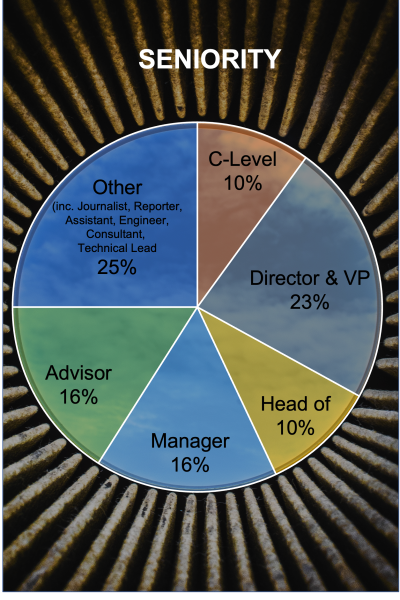
THE MONEY TRACK – FUNDING EUROPE’S CLIMATE GOALS
Finally, regardless of the innovation and efficacy of applications of policy and technology, nothing can advance without funding. The Europe Tech for Climate Action was appropriately end-capped with a discussion around the critical arena of effectively financing climate action activities in the EU…more The moderator was Elina Bardram, Director, Adaptation & Resilience, Communication and Civil Society Relations, DG CLIMA, European Commission. Panelists included: Ans Persoons, Deputy Mayor, Alderwoman of Town Planning and Public Spaces for the City of Brussels Giulio Federico, Head of Unit, Recovery and Resilience Task Force – Secretariat General, European Commission Christian Joelck, Co-founder & Partner, 2150 Martin Langer, CTO, OroraTech Funding is a critical enabler for the transformation underway under the Green Deal. The transformation is impacting how we consume, produce, do business, and simply live work and play. And it is most powerful when two funding sources are combined – private and public. Giulio Federico addressed the Recovery Resilience Facility (RRF) mentioned at the start of the conference by the State Secretary of Finland, and first announced by the EU in July 2020. The overall facility is a €700B mixture of grants and loans to be disbursed to states by the end of 2026. The facility has a strong green architecture bent with a couple of key elements: 1. Climate targets – about 40% of the use must be towards Climate investments 2. Application of the funds do no harm to any of the other elements 3. Reform element to enable private sector to invest in green / climate reforms, such as in urban planning, waste management, etc. 4. Green bonds – the Commission is also borrowing money, with about €250B bond issuance as the aim. €28B have been issued to date. Most member states have approved plans with the commission, and about €500B have been spent, with €200B of the funds have been tagged with ‘climate’ such as EV Charging and energy efficiency renovations. In fact, on innovation, €15B of that have gone to efforts in R&D. And to date about €115B have been disbursed. The other policy Giulio highlighted was REPowerU to address the energy crisis erupting from the Russian invasion of Ukraine. REpowerU will help redirect some of the funds of the RRF towards green objectives catalyzed by the War, as an active move to reduce Europe’s reliance on Russian fossil fuel. The plan is still under review but is progressing through the regulatory review process. Still, Mr. Federico admits that governments, being risk-averse, are not very good at picking new technologies, and needs to rely on bottom-up diligence within the member states. As Deputy Mayor of Brussels, Ms. Persoons unsurprisingly made the case for more funding needed by cities. She cites the importance of cities as a major force of creativity and innovation, and “are more ambitious”. She believes that cities can effectively demonstrate “compromise between heritage and energy goals” as she described in her welcoming remarks and have the autonomy to be recipients and drivers of new technologies and innovation. But the key is access, information around best practices, and pooling resources for group purchasing to make investments more affordable. And above all, as had been raised in other parts of the day, data is paramount. Policies instituted by cities must be evidence-based – to help decision making based on information, not emotion, and to influence how people can make rational and right choices. The Venture Capital representative on the panel, Christian Joelck, was frank in his support and focus on cities, declaring “cities are where climate battles are lost or won” and that they need to be empowered with viability criteria and decision-making support for the right kinds of investments. Considering the recent news from the IEA and their “World Energy Outlook” that we are on course to have temperatures peak in 2030 but at 2 to 2.5 degrees, we are in dire need to fund startups as soon as possible. We do not have the classic luxury of waiting 5-10 years for a venture progress to commercial success – which is typical in traditional VC models. At the same time, Mr. Joelck estimates that we need to mobilize €2T every year for the next several years. Given the rough estimates that the world will have spent more than €12T on the Covid crisis by 2024, we would hopefully expect that the climate crisis – arguably more damaging and lethal to humanity and the world – would have similar if not greater expenditure of capital. Mr. Joelck’s venture firm, 2050, is focused on finding ventures that have matured to a point of having a product, but not yet ‘discovered’. Rather than flashy “consumer tech companies” he prefers finding “unsexy hardware cases” that reduces CO2 and restores biodiversity and help scale them through stakeholder engagement. 2050 also has a more sophisticated success model of where they take the startups in which they invest and actively connect them with industry and have a whole platform team focused on connecting startups with cities and “disrupt the supply chain” – such as in electrifying construction sites to manage air pollution and manage energy consumption. Meanwhile, 2050 also has a goal of regenerating and change 5 cities over the next 5 years, in collaboration with C40. The panelist’s resident entrepreneur, Martin Langer, brought to life the kind of innovations that venture funding like impact capital could stimulate and help scale. His four-year-old venture, OroraTech, monitors the earth’s temperatures to track for fires where fires should not be burning through a constellation of small satellites. With the ability to capture and visualize the data, Ororatech can help cities and communities prepare and manage climate-related disasters, as well as better manage urban planning. Mr. Langer called out a specific obstacle to greater engagement and risk-taking by public figures and organizations. Technology start-ups are a combination of a marathon with countless 100-meter sprints, with some of those sprints failing. And that is the obstacle – the general fear of failure in the public domain that impedes risk-taking in funding innovation and/or adopting new technologies. While the public (EU) and private (VC) funding initiatives are clearly in motion, we do need to address some of the challenges that persist, including identifying the right initiatives to fund and enabling access to the financing. Above all, there needs to be a greater appetite for risk, and a different attitude from city and state government towards ‘failure’ as the nature of innovation encompasses improvements and pivots towards better outcomes that emerge from failed sprints. Ultimately, the challenges we face are enormous. NOT funding or financing technologies is not an option. We are still in the early days of innovation for sustainability impact, and in the ways that private and public leaders can work together as an engine towards progress and ultimate climate outcomes.
CONCLUSION
The inaugural Tech for Climate Action conference in Europe successfully set the scene to explore and tackle critical factors that play into achieving tremendously ambitious goals around climate action, together in collaboration across a diverse set of stakeholders with Cities as the fulcrum. While the tone was urgent and frank, the examples and details were anchored with pragmatism, transparency, hopefulness and an eager to embrace for how innovation and technology will continue to drive breakthroughs that we have yet to even imagine.
In a few short months, we will travel across the Atlantic to host the first U.S event for Tech for Climate Action in March 2023, in Washington D.C. Considering the Biden administration’s recently proposing the Federal Supplier Climate Risks and Resilience Rule that would require government suppliers to disclose emissions and climate-related risk data, alongside the Inflation Reduction Act that offers tax credits, incentives and other provisions intended to help tackle climate change, increase investments in renewable energy and enhance energy efficiency – the first U.S. Tech for Climate in the nation’s capital promises to be focused on action and outcomes. While some industry, political and investment angles will likely vary somewhat from what we sampled in Europe, we expect that many similar themes to emerge.
And the call to action will be profoundly meaningful to how we ultimately share this home called Earth and the future together. We look forward to taking bold new steps coming out of Europe and seeing you in Washington D.C.



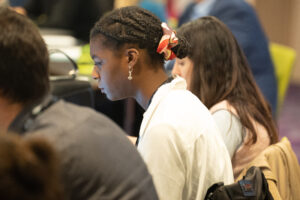


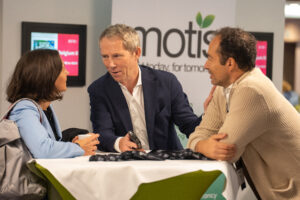


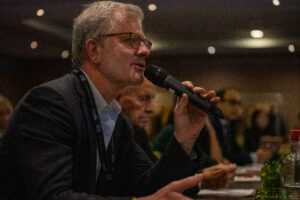






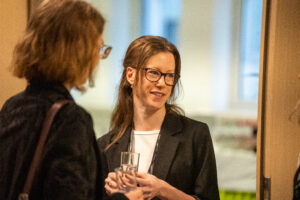

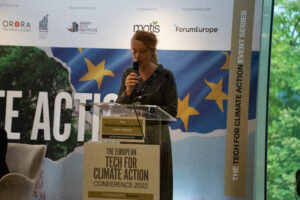


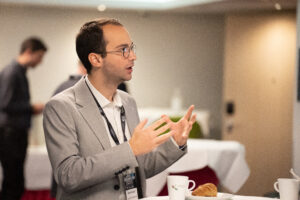
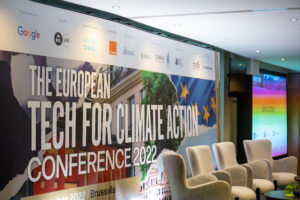

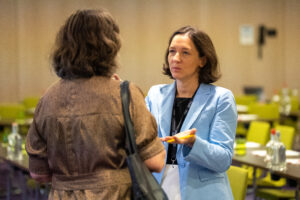
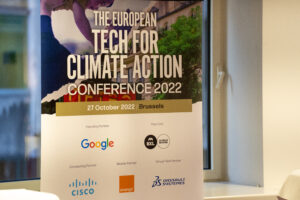
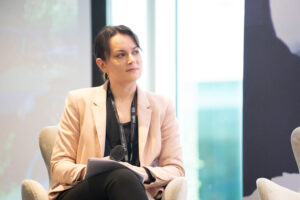





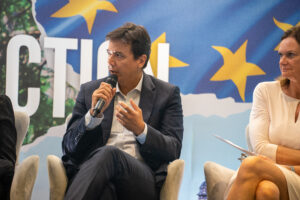

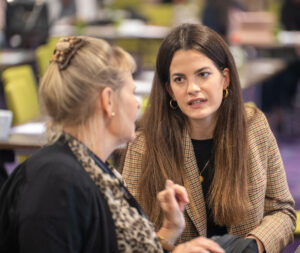


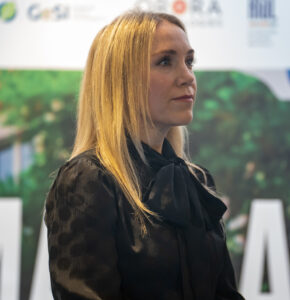
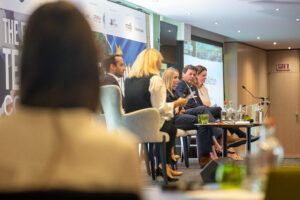


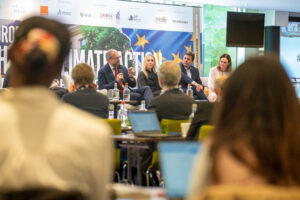
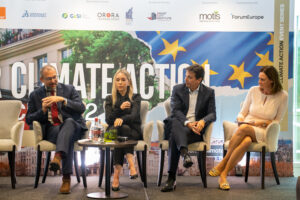


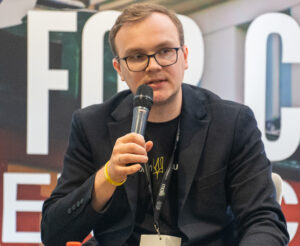
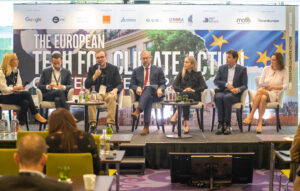




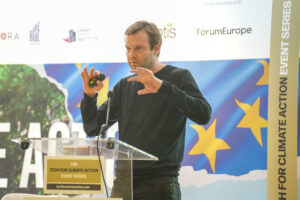
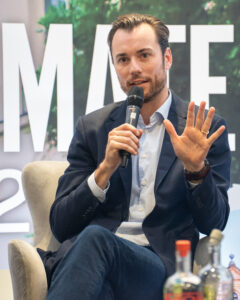
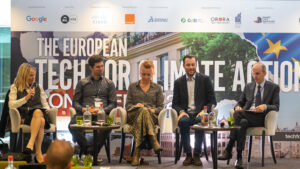




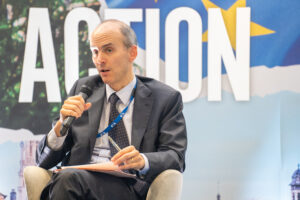

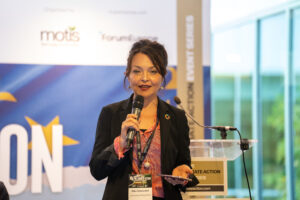
Disclaimer: The content of this website has not been approved by the United Nations and does not reflect the views of the United Nations or its officials or Member States
Thon Hotel EU
Rue de la Loi 75, 1040 Brussels, Belgium
For more information on any aspect of this event, please contact one of the team at questions@techforclimateaction.com